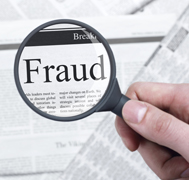 What is due diligence in real estate? As a real estate sales professional, you already know that performing real estate due diligence is an important part of your daily routine in mitigating the risk of real estate fraud. With due diligence, you can unearth significant transaction issues that could have meant serious problems had you missed the warning signs early in the process. But what is due diligence in real estate, really?
What is due diligence in real estate? As a real estate sales professional, you already know that performing real estate due diligence is an important part of your daily routine in mitigating the risk of real estate fraud. With due diligence, you can unearth significant transaction issues that could have meant serious problems had you missed the warning signs early in the process. But what is due diligence in real estate, really?
Every real estate professional’s worst nightmare is not catching real estate fraud. Without the proper tools and knowledge of what to look for, it can be all too easy to miss the problematic details. You need to learn how to use the right tools to mitigate risk and not find yourself in the middle of real estate fraud. Everyone in the real estate business has to constantly be on their toes.
Due diligence is your best tool to avoid fraud. What types of real estate fraud might you encounter? The most common are title fraud and value fraud.
Title fraud can mainly be avoided with title insurance. However, due diligence is easy in this case – even though you should independently verify who is on title to the home, you also need to interview the borrowers. Be thorough in your interview by asking for identification, questions about the home, sales history, even things in the area that may help you identify potential problems.
Another situation you should be watching for when performing real estate due diligence is value fraud. This is a form of mortgage fraud where the value of a home is deliberately appraised above its market value. The overstated value is commonly used to help a seller get a better price than the market would warrant.
Whether you are trying to prevent fraud or simply keep a deal viable, performing your due diligence starts at the application stage. What is due diligence in real estate? It starts with verifying the buyers’ and sellers’ information:
For sellers:
- Ask to see your client’s identification.
- Confirm that your client is the legal homeowner.
- Check that your client is the only legal homeowner (and if they are not, make sure you know who all other legal homeowners are before proceeding).
- Ensure that there is enough equity to cover closing costs – including your commission – on registered mortgages.
- Review the property’s sales history for suspicious activity or other issues.
For buyers:
- Ask to see the client’s identification.
- Ensure that your client is able to finance a mortgage.
- When a client tells you that the purchase depends on another property’s sale, check that there’s enough equity on the other property to finance another purchase (including land transfer taxes and related closing costs).
As a real estate sales professional, you know it pays to do your due diligence from day one on every transaction. You work hard to do your research, using the right tools to validate your clients’ information first to ensure a successful deal and eventual close – make it count.
Even if the most trustworthy client provides all the right documents, such as a recent MPAC assessment, it doesn’t mean you shouldn’t independently verify a prospective client’s information – it’s not only due diligence, it’s smart.
What is due diligence in real estate? It’s about leveraging online tools and technology, like GeoWarehouse, to mitigate the risk of fraud and save substantial time and money. Not a GeoWarehouse subscriber yet?
Learn more about how you can use this powerful resource to easily and efficiently perform your due diligence, visit www.geowarehouse.ca.







